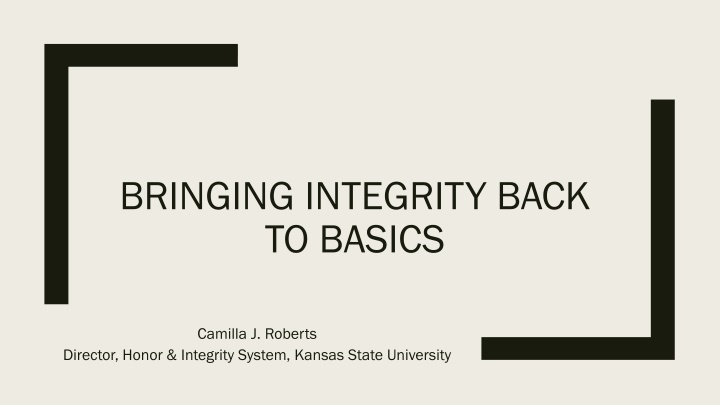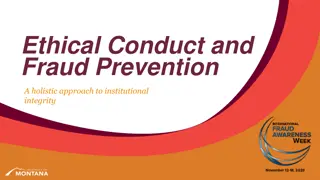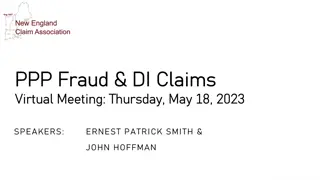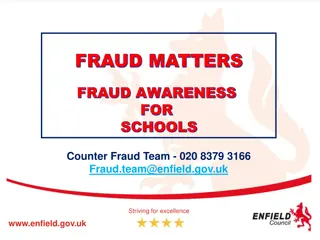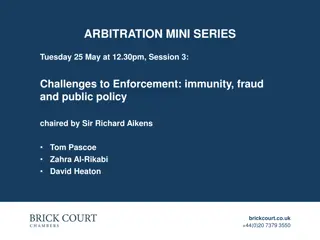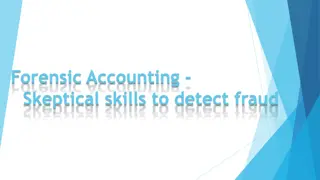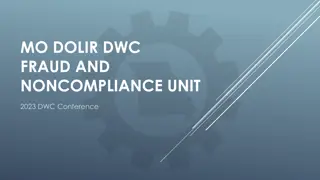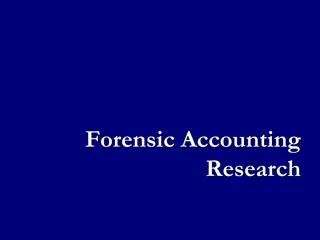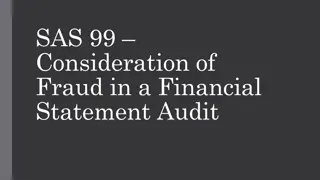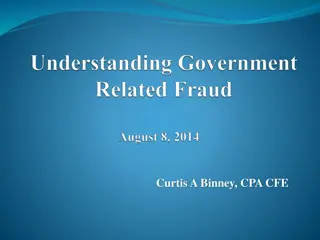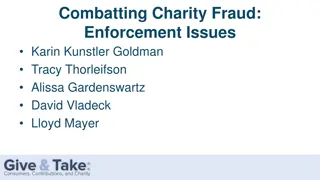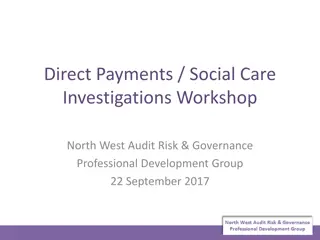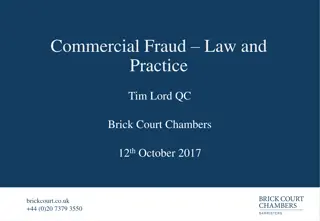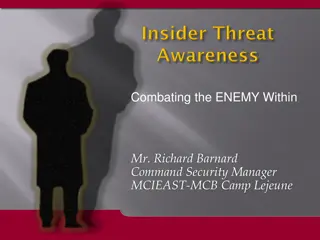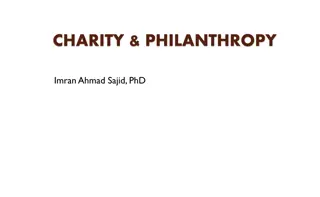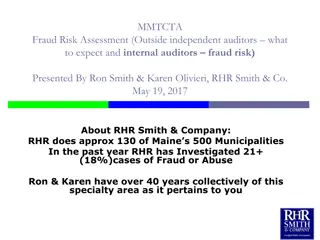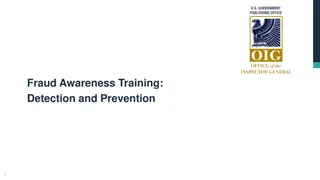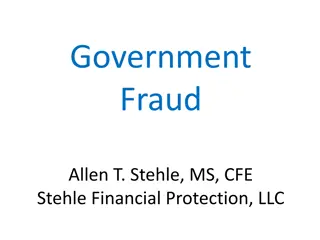Insider Charity Fraud Research 2018 Overview
An in-depth look at insider charity fraud in the UK charity sector, highlighting key findings from research conducted in 2018 by the Charity Commission for England and Wales. The research sheds light on the prevalence and risk factors of fraud within charities, emphasizing the importance of internal controls in preventing such incidents.
Download Presentation

Please find below an Image/Link to download the presentation.
The content on the website is provided AS IS for your information and personal use only. It may not be sold, licensed, or shared on other websites without obtaining consent from the author.If you encounter any issues during the download, it is possible that the publisher has removed the file from their server.
You are allowed to download the files provided on this website for personal or commercial use, subject to the condition that they are used lawfully. All files are the property of their respective owners.
The content on the website is provided AS IS for your information and personal use only. It may not be sold, licensed, or shared on other websites without obtaining consent from the author.
E N D
Presentation Transcript
BRINGING INTEGRITY BACK TO BASICS Camilla J. Roberts Director, Honor & Integrity System, Kansas State University
AGENDA Introduction Fundamental Values of Academic Integrity Student Decision Making and Development Why Students Cheat Student Development Why Students Don t Cheat and Community Building Assessing Students What you can do with this knowledge
Fundamental Values of Academic Integrity Honesty Trust Fairness Respect Responsibility Courage
Honesty Be truthful Give credit to the owner of the work (i.e., musician, author, artist, speaker etc.) Keep promises Provide factual evidence Aspire to objectivity, consider all sides and one's own potential preconceptions
Trust Clearly state expectations and follow through Promote transparency in values, processes, and outcomes Trust others Give credence Encourage mutual understanding Act with genuineness
Fairness Apply rules and policies consistently Engage with others equitably Keep an open-mind Be objective Take responsibility for your own actions
Respect Practice active listening Receive feedback willingly Accept that others thoughts and ideas have validity Show empathy Seek open communication Affirm others and accept differences Recognize the consequences of our word and actions on others
Responsibility Hold yourself accountable for your actions Engage with others in difficult conversations, even when silence might be easier Know and follow institutional rules and conduct codes Create, understand, and respect personal boundaries Follow through with tasks and expectations Model good behavior
Courage Be brave even when others might not Take a stand to address a wrongdoing and support others doing the same Endure discomfort for something you believe in Be undaunted in defending integrity Be willing to take risk and risk failure
Why Students Cheat Opportunities to do so Under pressure or stress No connection to the course Fairness ( Others do it. ) Class Reinforces Extrinsic, not Intrinsic Goals Not Sure what Constitutes Cheating or Do Not Think They Would Be Caught
Astins Theory of Challenge and Support Astin, A. W. (1984). Student involvement: A developmental theory for higher education. Journal of College Student Personnel, 25(4), 297 308.
Perrys Theory of Intellectual and Ethical Development Perry, W. G. (1970). Forms of intellectual and ethical development in the college years: A scheme. Holt, Rinehart, and Winston.
Student Development Chickering and Chickering and Reisser s (1993) (1993) Developing Competence Managing Emotions Moving Through Autonomy to Interdependence Developing Mature Interpersonal Relationships Establishing Identity Developing Purpose Developing Integrity Reisser s Seven Vectors of Student Development Seven Vectors of Student Development Chickering A. W. & Reisser, L. (1993). Education and identity. San Francisco: Jossey-Bass.
Why Students Dont Cheat and Building Community The norm on campus is to not cheat. There are consequences to being academically dishonest and there is a high probability of being caught. Students are committed to learning.
How does knowing this help us? Understanding the needs of students Challenge and support student Building the community of integrity Classroom expectations Institutional expectations
Assessing Students Important to remember type of assessment related to student development. Understanding group projects / collaboration Need for all assessments (more low stake assessments) Communication is important Various Types of Assessments are important
What You Can Do Assessment Styles for first year students versus graduate students (FAIRNESS Remember dualistic vs. multiplicity (FAIRNESS) Assessments in teams versus individual (HONESTY, RESPECT) How can they work together? Assessment from the teams as part of the grade (HONESTY, RESPECT) Rules, Policies, and Regulations in the Classroom (RESEPCT, HONESTY) Building community (RESEPCT, HONESTY) Reiteration of everything (RESPECT, RESPONSIBILITY) (RESPECT, RESPONSIBILITY) Not hand holding, but working with students
What You Can Do Understanding authentic learning what do you really need to assess? (RESPONSIBILTY) (RESPONSIBILTY) Lower Stakes Assessments possibly Give them a voice (RESPECT, TRUST, COURAGE) (RESPECT, TRUST, COURAGE) Build the community Find the source of motivation (RESPECT, TRUST, COURAGE) Allow them to decide topics (within reason) Talk about why your class and integrity is important (RESPECT, TRUST, COURAGE)
What You Can Do Adapt teaching / assessments to a variety of learning styles (FAIRNESS) Writing, presentations, projects, etc. (FAIRNESS) Let them see examples of good, mediocre, and poor work (HONESTY) Provide a rubric for quality rather than just for a grade (HONESTY) Holding them accountable (COURAGE, RESPONSIBILITY) (COURAGE, RESPONSIBILITY) Students who know you will hold them accountable are less likely to try to do something inappropriate. I can help, but students need to be held accountable and have due process
My Conclusions Academic misconduct CANNOT be eliminated It CAN be minimized, lessoned, or reduced New challenges will continue to evolve Education and awareness are key It takes time to be vigilant and engaged Focus on prevention of misconduct It can be frustrating (especially at the end of the term) Have the Courage to do what is Right and do it with compassion Address the issue with the student Document the issue with an Integrity Violation Follow-up with takedown notices
